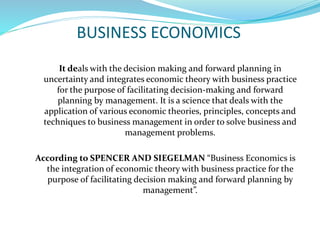Business and Economics Methods for Sustainable Growth in a Evolving World
Business and Economics Methods for Sustainable Growth in a Evolving World
Blog Article
Comprehending Financial Principles for Better Organization Decision-Making
In the complex landscape of modern-day service, a thorough understanding of economic concepts can significantly enhance decision-making processes. By checking out factors such as market frameworks and customer behavior, organizations can customize their strategies to straighten with affordable characteristics and customer requirements. In addition, insights right into need flexibility and opportunity prices offer a structure for maximizing source allowance. However, the application of these financial concepts frequently exposes unforeseen obstacles and opportunities that can redefine calculated techniques. What implications do these insights hold for the future of company approach?
The Fundamentals of Economic Theory
Economic concept acts as the foundation for recognizing just how people and organizations choose in the visibility of shortage. At its core, financial concept checks out the allocation of minimal resources to please endless desires. This basic concept of scarcity demands compromises, compelling decision-makers to review the advantages and prices connected with different choices.
Both primary branches of economic concept are macroeconomics and microeconomics. Microeconomics focuses on specific agents, such as consumers and companies, assessing their habits and communications in details markets. It stresses principles like supply and demand, cost flexibility, and market equilibrium, which are critical for comprehending just how rates are identified and just how resources are dispersed.
Alternatively, macroeconomics analyzes the economic situation in its entirety, dealing with wider problems such as rising cost of living, joblessness, and financial development. It offers understandings into systemic sensations that influence all economic representatives, assisting policymakers in crafting efficient economic strategies.
Eventually, a solid grounding in economic concept is essential for efficient service decision-making. By understanding the principles of deficiency, compromises, and market characteristics, companies can better navigate complicated atmospheres and make informed selections that enhance their competitive advantage.
Key Economic Indicators
Key economic indications act as important tools for analyzing the wellness and instructions of an economic situation, offering important understandings for organization decision-making. These signs are quantitative measures that show the economic efficiency and can be classified into leading, lagging, and coincident signs.
Leading signs, such as customer self-confidence indexes and stock exchange trends, forecast future financial activity, enabling businesses to anticipate modifications on the market. Delaying indications, like joblessness rates and business earnings, provide insights right into the economic climate's previous efficiency, aiding services to examine long-term trends. Coincident indicators, such as GDP development and retail sales, fluctuate simultaneously with the economy, offering a real-time photo of economic problems.
Recognizing these indications makes it possible for services to make enlightened decisions concerning financial investments, resource allocation, and calculated planning. By carefully checking these key economic signs, services can browse unpredictabilities and place themselves effectively in the ever-changing economic landscape, eventually boosting their decision-making procedures and long-lasting success.

Market Frameworks and Characteristics
Understanding market structures and characteristics is vital for businesses intending to grow in affordable atmospheres. Market frameworks, extensively categorized right into excellent competition, monopolistic competition, oligopoly, and monopoly, considerably affect pricing approaches, item distinction, and competitive actions. Each structure provides special obstacles and opportunities that can determine a company's strategic direction.
In perfect competition, many little companies compete, bring about minimal pricing power and homogeneous items. On the other hand, in monopolistic competitors, firms distinguish their products, allowing for some level of rates power while still dealing with competition. Oligopolies, defined by a few dominant players, cause synergistic decision-making; companies have to very carefully think about rivals' responses to their actions. Syndicates exist when a single firm regulates the market, resulting in maximum prices power but frequently drawing in regulatory analysis.
Comprehending these dynamics makes it possible for businesses to anticipate market trends, adjust strategies, and enhance resource allotment. Additionally, acknowledging exactly how exterior factors like innovation and guideline influence these frameworks can boost tactical preparation. By mastering market frameworks and characteristics, companies can make informed decisions, eventually boosting their competitive setting and driving sustainable development.
Consumer Habits Insights
Consumer actions plays a critical duty fit company approaches and results. Recognizing just how consumers make acquiring choices, their choices, and the variables influencing their behavior can significantly enhance a company's capability to meet market demands. Secret understandings into consumer habits can be originated from analyzing demographics, psychographics, and behavior patterns.
Market aspects such as age, gender, revenue, look at these guys and education degree offer a foundational understanding of target audience. Psychographics delve much deeper, discovering consumers' attitudes, way of livings, and worths, which can influence brand loyalty and item understanding. Behavior insights, such as acquiring regularity and action to promos, are vital for customizing advertising and marketing efforts.
Furthermore, external aspects like economic conditions, social trends, and technical advancements also impact consumer selections. As an example, during financial downturns, customers might focus on necessary products over address luxury things, changing need patterns.
Applying Business Economics to Method
Insights gained from customer behavior are instrumental in formulating reliable organization techniques. By leveraging financial principles, businesses can better recognize market characteristics, optimize resource allowance, and boost affordable placing. Analyzing demand flexibility, for instance, enables firms to adjust rates methods to make the most of profits while continuing to be attractive to consumers.
Additionally, recognizing market segmentation permits organizations to customize their offerings, ensuring they meet the certain demands and preferences of varied customer teams. Business and Economics. This targeted method enhances client satisfaction and fosters brand commitment

Incorporating video game theory into tactical planning likewise provides understandings into affordable habits, enabling firms to prepare for rival activities and design counter-strategies successfully.

Verdict
In final thought, an extensive understanding of financial concepts significantly improves service decision-making. By examining market structures, assessing consumer actions, and examining key economic indications, companies can develop effective strategies that align with market demands.
In the complex landscape of contemporary company, a thorough understanding of economic concepts can significantly improve decision-making processes.Leading indications, such as consumer confidence indexes and supply market fads, anticipate future financial activity, enabling services to expect changes in the market. By very closely keeping an eye on these vital financial indicators, businesses can browse uncertainties and place themselves efficiently in the ever-changing economic landscape, inevitably enhancing their decision-making procedures and lasting success.
By leveraging financial concepts, services can much better comprehend market characteristics, maximize resource allocation, and enhance affordable placing.In conclusion, a comprehensive understanding of economic principles dramatically enhances business decision-making.
Report this page